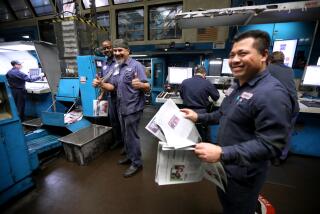South Bay paper revels in its first-ever Pulitzer Prize
When the big announcement came, no one in the newsroom believed the paper could actually win. There was no gathering planned, no food platters, no champagne.
Then, suddenly, city editor Frank Suraci let out a scream.
“Oh, my God! Oh, my God! Are you kidding me?”
The results came in Monday afternoon and staffers at the Daily Breeze, with its seven-reporter newsroom, learned they had just won their first-ever Pulitzer Prize.
The 63,000-circulation newspaper in Torrance took the award for local reporting for a six-month investigation that revealed possible corruption in a cash-strapped school district. More than 50 stories by reporters Rob Kuznia and Rebecca Kimitch — edited by Suraci — resulted in the removal of the Centinela Valley Union High School District’s highly paid superintendent.
Their reporting also prompted state legislation to prevent excessive compensation.
The staff at the South Bay paper was elated — and stunned.
Two hours after the announcement, they raced to buy sandwich platters and plastic flutes. In the conference room, they gathered to celebrate with speeches and the uncorking of champagne — some of which left Kuznia’s hair and shirt drenched.
“It never crossed our minds that this would even be submitted for an award,” Kimitch, a reporter for 15 years, told her colleagues. She said the problems they found were hurting the community they covered, and “we were allowed the chance to tell the story, wholeheartedly.”
The winners gave credit to their executive editor, Michael Anastasi, for pushing them.
Anastasi came to the paper, which is part of the Los Angeles News Group, from Salt Lake City in 2012.
In one of his first meetings with management, Anastasi recalls pressing editors to create Pulitzer-worthy work.
“I want us to play in the major leagues,” he told them. “The only thing that keeps us from achieving to the highest level is ourselves.”
Suraci thought he was nuts. In five years, his staff had been cut in half to seven reporters. Each day, the newsroom had to struggle with minimal resources to cover the vast South Bay area — its city halls, school districts and neighborhoods — and with constant pressure to fend off the much bigger Los Angeles Times.
Suraci, who joined the Daily Breeze 41 years ago, couldn’t recall a time when the paper submitted a story for a Pulitzer.
“I don’t think we’ve ever had anything worthy,” he said.
As he walked around the newsroom, a champagne bottle in his hand, he seemed dazed. Assigning Kuznia full time to the school district investigation had left his team even more short-handed, he said.
“There were so many stories we had to miss because we didn’t have the staffing,” Suraci said. “I kept thinking, let’s finish this, let’s do it right and let’s move on.”
The Pulitzer makes him feel vindicated — and sad. He pointed to the desks surrounding his.
“Look at this, “ he said. “Vacant. Vacant. Vacant. Vacant. Vacant.”
When he got to Kuznia’s desk, he paused.
“Vacant.”
The lead reporter on the winning story left journalism six months ago. He now works in public relations at USC.
The North Dakota native had worked a number of beats at tiny newspapers before landing at the Daily Breeze. His dream was to make it to the L.A. Times or the New York Times.
“Journalism was my thing,” he said. “I always felt lucky that I had found what I wanted to do in my 20s while others were still looking for it.”
But at 39, the career he so loved barely paid his bills. Six months into his job at the Breeze, he had to take a pay cut. While friends his age were buying homes, he was still renting and driving his old Honda, built in 1989.
He said the paper’s win was a testament to the importance of local journalism.
But the profession, he found, “seems to be melting and I felt too financially unstable.”
On Monday, his colleagues welcomed him back to the newsroom, if only for the day. They congratulated him with a warm pot pie, the food he lived off of during his long hours on the investigation.
Anastasi told him his old job was his. Other offers were likely to roll in.
But Kuznia couldn’t say whether he’d return to journalism.
esmeralda.bermudez@latimes.com
More to Read
Start your day right
Sign up for Essential California for news, features and recommendations from the L.A. Times and beyond in your inbox six days a week.
You may occasionally receive promotional content from the Los Angeles Times.







